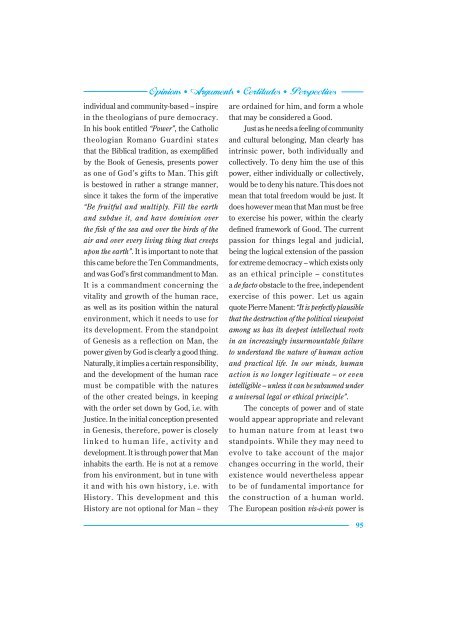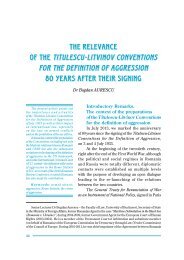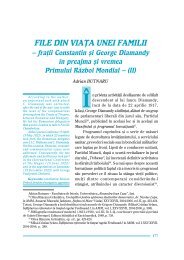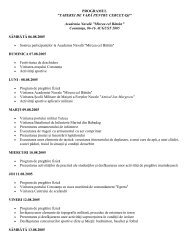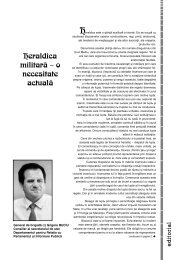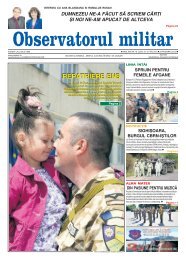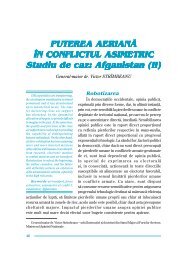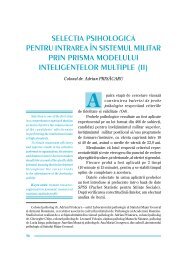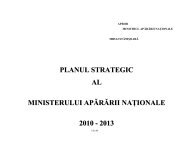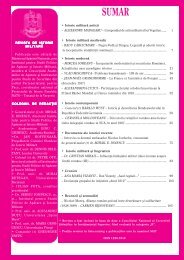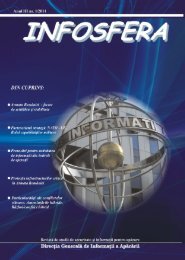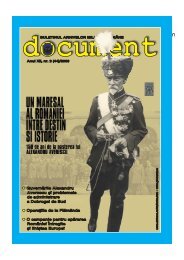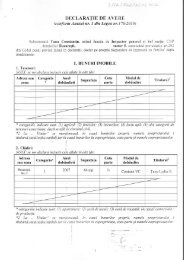Romanian Military Thinking
Romanian Military Thinking
Romanian Military Thinking
You also want an ePaper? Increase the reach of your titles
YUMPU automatically turns print PDFs into web optimized ePapers that Google loves.
Opinions • Arguments • Certitudes • Perspectives<br />
individual and community-based – inspire<br />
in the theologians of pure democracy.<br />
In his book entitled “Power”, the Catholic<br />
theologian Romano Guardini states<br />
that the Biblical tradition, as exemplified<br />
by the Book of Genesis, presents power<br />
as one of God’s gifts to Man. This gift<br />
is bestowed in rather a strange manner,<br />
since it takes the form of the imperative<br />
“Be fruitful and multiply. Fill the earth<br />
and subdue it, and have dominion over<br />
the fish of the sea and over the birds of the<br />
air and over every living thing that creeps<br />
upon the earth”. It is important to note that<br />
this came before the Ten Commandments,<br />
and was God’s first commandment to Man.<br />
It is a commandment concerning the<br />
vitality and growth of the human race,<br />
as well as its position within the natural<br />
environment, which it needs to use for<br />
its development. From the standpoint<br />
of Genesis as a reflection on Man, the<br />
power given by God is clearly a good thing.<br />
Naturally, it implies a certain responsibility,<br />
and the development of the human race<br />
must be compatible with the natures<br />
of the other created beings, in keeping<br />
with the order set down by God, i.e. with<br />
Justice. In the initial conception presented<br />
in Genesis, therefore, power is closely<br />
linked to human life, activity and<br />
development. It is through power that Man<br />
inhabits the earth. He is not at a remove<br />
from his environment, but in tune with<br />
it and with his own history, i.e. with<br />
History. This development and this<br />
History are not optional for Man – they<br />
are ordained for him, and form a whole<br />
that may be considered a Good.<br />
Just as he needs a feeling of community<br />
and cultural belonging, Man clearly has<br />
intrinsic power, both individually and<br />
collectively. To deny him the use of this<br />
power, either individually or collectively,<br />
would be to deny his nature. This does not<br />
mean that total freedom would be just. It<br />
does however mean that Man must be free<br />
to exercise his power, within the clearly<br />
defined framework of Good. The current<br />
passion for things legal and judicial,<br />
being the logical extension of the passion<br />
for extreme democracy – which exists only<br />
as an ethical principle – constitutes<br />
a de facto obstacle to the free, independent<br />
exercise of this power. Let us again<br />
quote Pierre Manent: “It is perfectly plausible<br />
that the destruction of the political viewpoint<br />
among us has its deepest intellectual roots<br />
in an increasingly insurmountable failure<br />
to understand the nature of human action<br />
and practical life. In our minds, human<br />
action is no longer legitimate – or even<br />
intelligible – unless it can be subsumed under<br />
a universal legal or ethical principle”.<br />
The concepts of power and of state<br />
would appear appropriate and relevant<br />
to human nature from at least two<br />
standpoints. While they may need to<br />
evolve to take account of the major<br />
changes occurring in the world, their<br />
existence would nevertheless appear<br />
to be of fundamental importance for<br />
the construction of a human world.<br />
The European position vis-à-vis power is<br />
95


